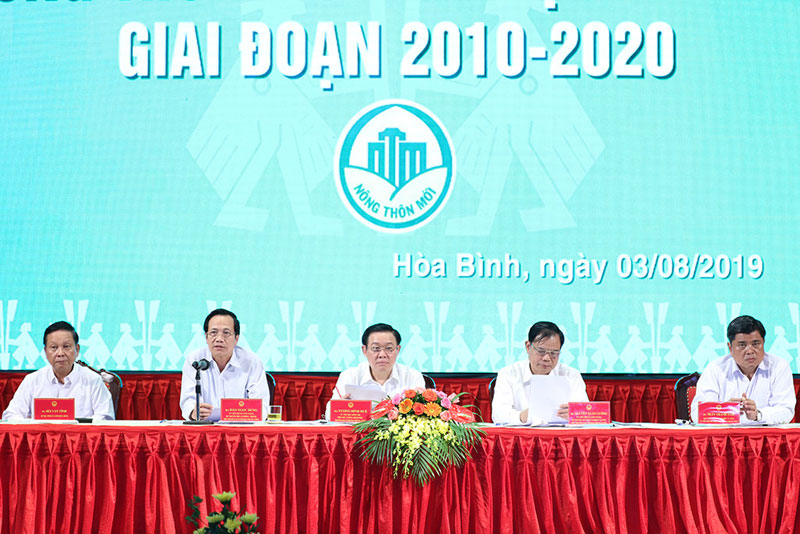
(HBO) - The National Steering Committee for National Target Programmes for 2016-2020 held a conference in Hoa Binh province to review new-style rural area building work in the northern mountainous area in the past decade and set out tasks for the post-2020 period.
The conference was chaired by Deputy Prime Minister and head
of the committee Vuong Dinh Hue. Hoa Binh’s leaders attending the event
included Bui Van Tinh, member of the Party Central Committee and Secretary of
the provincial Party Committee; and Bui Van Khanh, Vice Secretary of the
provincial Party Committee and Chairman of the provincial People’s Committee.
The conference, the first regional-level of its kind,
featured One Commune-One Product (OCOP) stalls run by different provinces.
 Deputy PM Vuong Dinh
Hue, representatives of ministries and sectors and leaders of Hoa Binh province
at the event.
Deputy PM Vuong Dinh
Hue, representatives of ministries and sectors and leaders of Hoa Binh province
at the event.
As of the end of June, northern mountainous provinces had
603 out of its total 2,280 communes, or 26.4 percent, meeting the new-style
rural standard. By the end of 2019, the figure is expected to hit 28 percent, fulfilling
the goal one year ahead of schedule as set in the Prime Minister’s Decision No
1600/QD-TTg issued on August 16, 2016.
Currently, the entire region has no communes meeting less
than five criteria of the standard. Each local commune meets 12.28 criteria on
average, lower than the national average of 15.26 criteria per commune.
Meanwhile, six local districts have so far been accredited by the PM as
new-style rural areas.
In the 2021-2025 period, the region sets to have at least
one province completing its new-style rural building mission, and each province
having one district meeting the standard.
Speaking at the conference, Bui Van Tinh shared Hoa Binh’s
experiences and methods in building new-style rural areas. The province has to
date had 71 out of 191 communes completing the work one year ahead of schedule.
The figure is expected to reach 77 by the end of 2019.
Deputy PM Vuong Dinh Hue suggested localities involved focus
on implementing the OCOP programme, adding that attention should also be paid
to preserving traditional cultural identities and protecting the environment./.
The Standing Board of the Hoa Binh provincial Party Committee has agreed in principle on a proposal by the Standing Board of the Party Committee of Hoa Binh city to gather feedback on the city’s 1:2000 zoning plan, which forms part of its broader urban development strategy.
Hoa Binh province has made notable progress in public administration reform and digital government development, with the satisfaction index among citizens and businesses reaching over 84%, according to recent government evaluations.
Thanks to great efforts by local authorities in recent times, the governance and public administration performance of Mai Chau district has been significantly improved.
In the afternoon of June 6, the Party Committee, the People's Council, the People's Committee and the Fatherland Front of Lac Son district solemnly held a meeting to celebrate the 139th anniversary of the district's founding (1886–2025) and the 79th anniversary of the establishment of the district's Party Committee (1946–2025). There was the attendance of Mr. Bui Van Thang, the Vice Chairman of the Provincial People's Council; Mr. Quach Tat Liem, the Vice Chairman of the Provincial People's Committee; Ms. Dang Bich Ngoc, the Deputy Head of the National Assembly Delegation of the province; as well as the former leaders of the province and district through various periods, who are the natives of the district.
Implementing the Politburo’s Resolution No. 57-NQ/TW on breakthroughs in science – technology, innovation, and digital transformation is a golden opportunity for the northern mountainous province of Hoa Binh to renew growth model, improve competitive edge and shorten digital gap.
Resolution 57-NQ/TW, issued by the Politburo on December 22, 2024, identifies sci-tech, innovation, and digital transformation as strategic breakthroughs to build a developed and prosperous nation. In Hoa Binh province, this spirit is not just a slogan, it’s being put into action through concrete initiatives that form a "new development triangle”: digital citizenship, digital economy, and digital administration.



 Deputy PM Vuong Dinh
Hue, representatives of ministries and sectors and leaders of Hoa Binh province
at the event.
Deputy PM Vuong Dinh
Hue, representatives of ministries and sectors and leaders of Hoa Binh province
at the event.